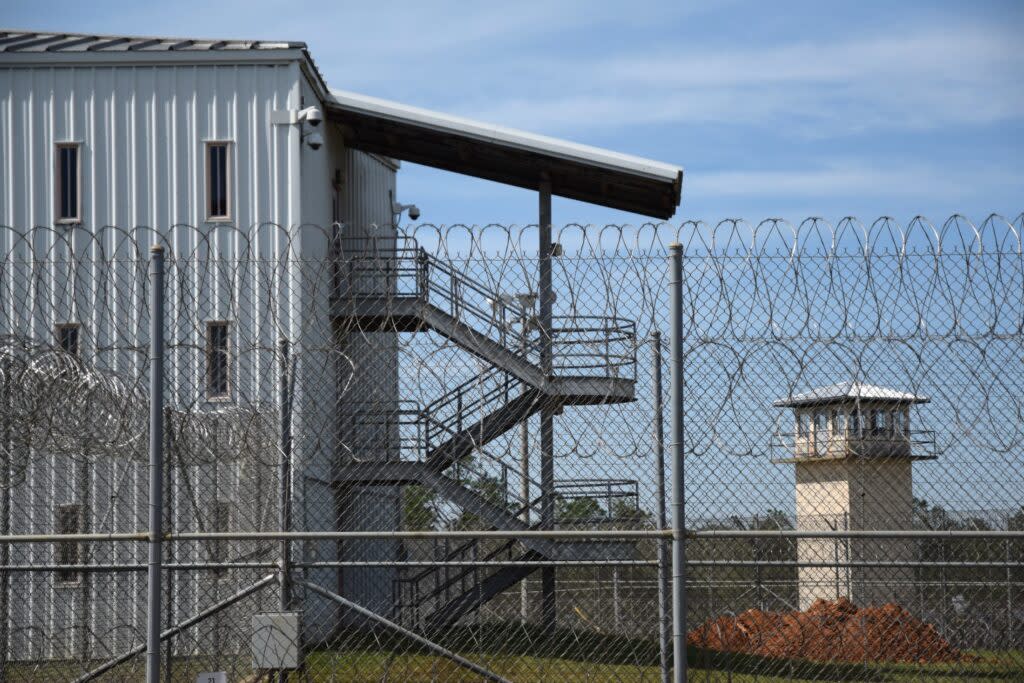Medical parole bill makes it through Alabama House committee

A prison dorm at Holman Correctional Facility on Oct. 23, 2019. (File)
A divided House Judiciary Committee Wednesday approved legislation allowing the Alabama Board of Pardons and Paroles to consider an applicant’s medical condition when reviewing a parole application.
HB 299, sponsored by Rep. Chris England, D-Tuscaloosa, made it through committee after lawmakers delayed passage for one week to modify the bill in a subcommittee.
“I wouldn’t necessarily say it is friendly, but I will say it is a compromise,” England said of the modifications made to the bill in the subcommittee. “And I appreciate their work on it.”
GET THE MORNING HEADLINES DELIVERED TO YOUR INBOX
The modified bill states that an individual denied parole, and who has been convicted and incarcerated of a nonviolent offense and has spent at least 20 years in prison, will be eligible to apply for parole five years after denial. An individual who has served at least 15 years of a prison term and is at least 67 years old will also have the opportunity to apply for parole five years after a denial.
Individuals serving a life sentence for capital murder or for a Class A felony sexual offense will not be eligible.
Legislators kept language that requires members of the parole board to consider a person’s age and health status when making the decision to grant someone parole. It also allows those who have a “serious chronic health condition” the right to appeal the Board’s decision within 28 days of the Board’s decision.
The legislation defines a serious health condition as “any non-terminal physical or medical condition rendering an individual permanently and irreversibly incapacitated as determined by reasonable medical judgment.”
The circuit court judge who presided over the trial will hear the appeal should the Parole Board deny the person parole. The applicant may make a final appeal to the Alabama Court of Criminal Appeals.
England managed to clear the bill through subcommittee by agreeing to lengthen the amount of time after a parole denials before an incarcerated individual becomes eligible again.
As filed, the person who is incarcerated could apply for parole two years after a parole denial if the person was convicted of a nonviolent offense and spent at least 20 years in prison. This bill also would have allowed a person who is at least 60 years old and had served at least 10 years in prison to apply to parole within two years after getting denied.
Currently, people who are incarcerated must wait five years to reapply for parole after the Board denies their request for release.
HB 299’s passage through committee was a rare bright spot for criminal justice reform advocates in what has been a difficult session for their proposals, with many pieces of legislation having either been delayed or outright denied.
Overcrowding within Alabama’s prisons has been an ongoing concern among criminal justice reform advocates along with the violence that has plagued the correctional facilities. In 2023, more than 300 people died while in custody of the Alabama Department of Corrections, according to Alabama Appleseed, a nonprofit that focuses on criminal justice reform.
At the same time, the parole rate in Alabama has declined significantly. According to the ACLU of Alabama, only 7% of people who were incarcerated and applied for parole were granted it in July and August 2023.
The bill will need at least three legislative days to pass. Tuesday is the 24th legislative day of the 2024 session, which can run a maximum of 30 days in a 105-day calendar period.
The post Medical parole bill makes it through Alabama House committee appeared first on Alabama Reflector.

